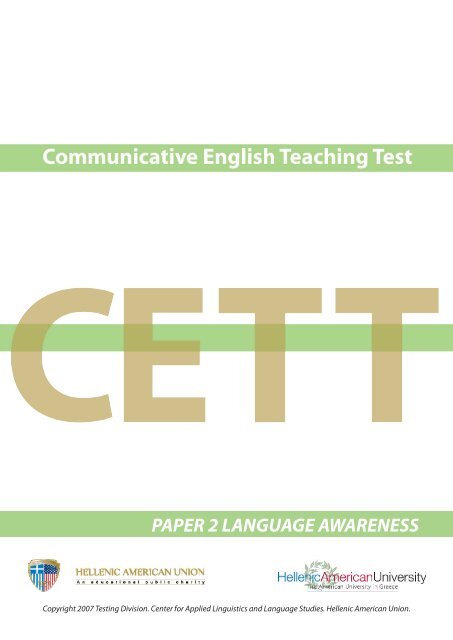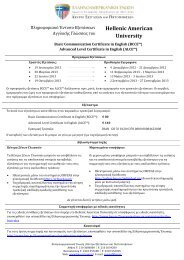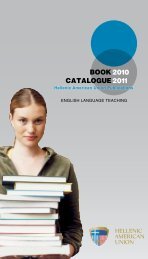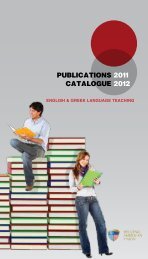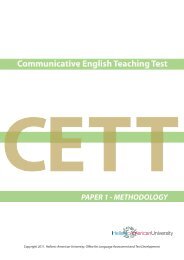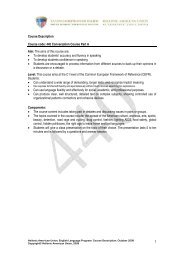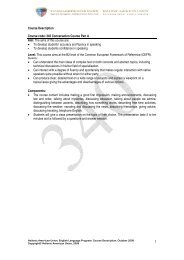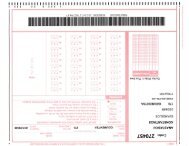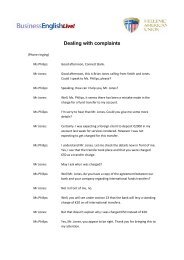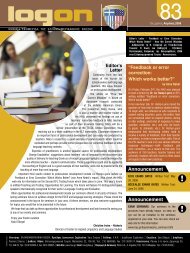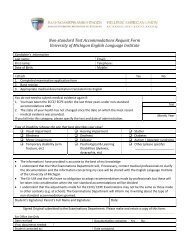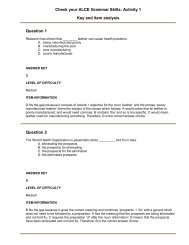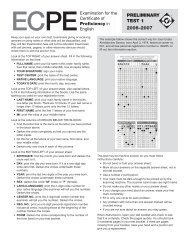PAPER 2 LANGUAGE AWARENESS - Hellenic American Union
PAPER 2 LANGUAGE AWARENESS - Hellenic American Union
PAPER 2 LANGUAGE AWARENESS - Hellenic American Union
You also want an ePaper? Increase the reach of your titles
YUMPU automatically turns print PDFs into web optimized ePapers that Google loves.
<strong>PAPER</strong> 2 <strong>LANGUAGE</strong> <strong>AWARENESS</strong><br />
Copyright 2007 Testing Division. Center for Applied Linguistics and Language Studies. <strong>Hellenic</strong> <strong>American</strong> <strong>Union</strong>.
Communicative English Teaching Test<br />
Overview<br />
<strong>PAPER</strong> 2 <strong>LANGUAGE</strong> <strong>AWARENESS</strong><br />
This paper of the CETT tests language awareness and grammatical knowledge. There are 6 sections in<br />
this paper which cover the following areas:<br />
Section 1 Tenses 15 points<br />
Section 2 General errors 20 points<br />
Section 3 Language functions 10 points<br />
Section 4 Semantic differences 20 points<br />
Section 5 Grammatical terminology 5 points<br />
Section 6 Reading comprehension 20 points<br />
Total<br />
90 points<br />
Note:<br />
• You will have one hour and 45 minutes to complete Paper 2.<br />
• Use pen throughout the test.<br />
• Write all your answers in the test booklet.<br />
• Please make sure to write your answers clearly.<br />
• You will be assessed on your use of language in this paper.<br />
2
<strong>PAPER</strong> 2 - <strong>LANGUAGE</strong> <strong>AWARENESS</strong><br />
SECTION 1: TENSES<br />
_____ / 15 POINTS<br />
The sentences below are incorrect. Look at the underlined verbs then:<br />
a) correct the tense<br />
b) name the correct tense<br />
c) give the meaning or use of the correct tense in this context.<br />
Example:<br />
I do the housework at the moment.<br />
a) I’m doing the housework at the moment.<br />
b) present continuous<br />
c) describes an action happening now<br />
1. A: The price of petrol has increased a great deal last year.<br />
B: I know. That’s why more people spent their holidays at home.<br />
a. _________________________________________________________________________________<br />
b. _________________________________________________________________________________<br />
c. _________________________________________________________________________________<br />
2. A: Every year salmon are returning to fresh water to reproduce.<br />
B: And that’s why dams pose a major threat to salmon stocks.<br />
a. _________________________________________________________________________________<br />
b. _________________________________________________________________________________<br />
c. _________________________________________________________________________________<br />
3. A: When I was at school I was studying a lot.<br />
B: I guess that’s why your grades were always better than mine.<br />
a. _________________________________________________________________________________<br />
b. _________________________________________________________________________________<br />
c. _________________________________________________________________________________<br />
4. A: When the lightning struck the house, I ate my breakfast.<br />
B: I bet you ended up with one hot meal!<br />
a. _________________________________________________________________________________<br />
b. _________________________________________________________________________________<br />
c. _________________________________________________________________________________<br />
SECTION 1: TENSES<br />
3
Communicative English Teaching Test<br />
5. A: A type of bird flu is believed to cause the 1918 outbreak of the deadly Spanish flu.<br />
B: I suppose that’s the reason authorities have been concerned about recent outbreaks of<br />
bird flu in Asia.<br />
a. _________________________________________________________________________________<br />
b. _________________________________________________________________________________<br />
c. _________________________________________________________________________________<br />
6. A: He’s reading this book since 9 o’ clock.<br />
B: Yeah, he told me that it’s one of the best books he’s ever read.<br />
a. _________________________________________________________________________________<br />
b. _________________________________________________________________________________<br />
c. _________________________________________________________________________________<br />
7. A: Marilyn Monroe has been married three times before her untimely death.<br />
B: I wonder which of those marriages was her happiest.<br />
a. _________________________________________________________________________________<br />
b. _________________________________________________________________________________<br />
c. _________________________________________________________________________________<br />
8. A: By the end of this course, participants will learn a variety of computer skills.<br />
B: That should give them a better chance of getting a job.<br />
a. _________________________________________________________________________________<br />
b. _________________________________________________________________________________<br />
c. _________________________________________________________________________________<br />
9. A: My aunt is owning a house by the sea.<br />
B: Ah, so that’s why you visit her every summer!<br />
a. _________________________________________________________________________________<br />
b. _________________________________________________________________________________<br />
c. _________________________________________________________________________________<br />
10. A: I wish Katie will arrive soon.<br />
B: So do I. It’s getting late. We’ll never make our flight!<br />
a. _________________________________________________________________________________<br />
b. _________________________________________________________________________________<br />
c. _________________________________________________________________________________<br />
4<br />
SECTION 1: TENSES
<strong>PAPER</strong> 2 - <strong>LANGUAGE</strong> <strong>AWARENESS</strong><br />
SECTION 2: GENERAL ERRORS<br />
_____ / 20 POINTS<br />
Each of the sentences below contain one error. Rewrite the whole sentence offering ONE correct version.<br />
Then, in note-form, explain why the correction is needed.<br />
Example:<br />
I have been working here since six years.<br />
a) I have been working here for six years.<br />
b) ‘since’ is followed by a specific moment in the past, whereas ‘for’ is used with a period of time<br />
11. Let’s discuss about your hobbies.<br />
a. _________________________________________________________________________________<br />
b. _________________________________________________________________________________<br />
12. I want that you tell me the answer.<br />
a. _________________________________________________________________________________<br />
b. _________________________________________________________________________________<br />
13. Say it again. You did a mistake.<br />
a. _________________________________________________________________________________<br />
b. _________________________________________________________________________________<br />
14. Read more carefully this information before you write anything.<br />
a. _________________________________________________________________________________<br />
b. _________________________________________________________________________________<br />
15. Yes, is necessary for you to write your name here.<br />
a. _________________________________________________________________________________<br />
b. _________________________________________________________________________________<br />
SECTION 2: GENERAL ERRORS<br />
5
Communicative English Teaching Test<br />
16. We were so fascinating that we watched the DVD twice.<br />
a. _________________________________________________________________________________<br />
b. _________________________________________________________________________________<br />
17. My parents will get me a car as a present after I will pass my driving test.<br />
a. _________________________________________________________________________________<br />
b. _________________________________________________________________________________<br />
18. Who broke the window will have to pay for it.<br />
a. _________________________________________________________________________________<br />
b. _________________________________________________________________________________<br />
19. The Lake Michigan is one of the five Great Lakes of the United States.<br />
a. _________________________________________________________________________________<br />
b. _________________________________________________________________________________<br />
20. You will help me with my homework, please?<br />
a. _________________________________________________________________________________<br />
b. _________________________________________________________________________________<br />
6<br />
SECTION 2: GENERAL ERRORS
<strong>PAPER</strong> 2 - <strong>LANGUAGE</strong> <strong>AWARENESS</strong><br />
SECTION 3: <strong>LANGUAGE</strong> FUNCTIONS<br />
_____ / 10 POINTS<br />
Write two example sentences for each of the following pairs of 5 language functions. In each case,<br />
pay attention to the style and register.<br />
Example:<br />
To decline an invitation to a friend’s party during a conversation.<br />
I’m really sorry, but I’m afraid I can’t come to your party.<br />
To decline an invitation to a conference in a letter.<br />
Unfortunately, I will be unable to attend the conference in Munich this year.<br />
21. a. To express regret about forgetting a friend’s birthday in a conversation.<br />
_______________________________________________________________________________________<br />
b. To express regret to an unsuccessful applicant for a job in a letter.<br />
_______________________________________________________________________________________<br />
22. a. To suggest a holiday destination in a letter to a friend.<br />
_______________________________________________________________________________________<br />
b. To suggest hiring new staff at a company meeting.<br />
_______________________________________________________________________________________<br />
23. a. To predict rain to a friend who is about to leave the house.<br />
_______________________________________________________________________________________<br />
b. To predict rain in a newspaper weather forecast.<br />
_______________________________________________________________________________________<br />
24. a. To warn a child about to cross the road that there is a car approaching.<br />
_______________________________________________________________________________________<br />
b. To warn an employee about the consequences of arriving at work late again.<br />
_______________________________________________________________________________________<br />
25. a. To request clarification from a friend in a cafeteria with loud music.<br />
_______________________________________________________________________________________<br />
b. To request clarification from a company about the price of a product in an email.<br />
_______________________________________________________________________________________<br />
SECTION 3: <strong>LANGUAGE</strong> FUNCTIONS<br />
7
Communicative English Teaching Test<br />
SECTION 4: SEMANTIC DIFFERENCES<br />
_____ / 20 POINTS<br />
Describe the difference in meaning between these pairs of sentences.<br />
Example:<br />
a) She likes playing tennis.<br />
She enjoys doing this sport<br />
b) She’d like to play tennis.<br />
She wants to play this sport.<br />
26. a) John has to learn some Spanish.<br />
_______________________________________________________________________________________<br />
b) John has learned some Spanish.<br />
_______________________________________________________________________________________<br />
27. a) We regret to tell you that the flight has been cancelled.<br />
_______________________________________________________________________________________<br />
b) We regretted telling them that the flight had been cancelled.<br />
_______________________________________________________________________________________<br />
28. a) At first, she liked his voice.<br />
_______________________________________________________________________________________<br />
b) First, she liked his voice.<br />
_______________________________________________________________________________________<br />
29. a) We’re celebrating her getting promoted.<br />
_______________________________________________________________________________________<br />
b) We’re celebrating getting promoted with her.<br />
_______________________________________________________________________________________<br />
8<br />
SECTION 4: SEMANTIC DIFFERENCES
<strong>PAPER</strong> 2 - <strong>LANGUAGE</strong> <strong>AWARENESS</strong><br />
30. a) “The family matters”, he said.<br />
_______________________________________________________________________________________<br />
b) “These are family matters”, he said.<br />
_______________________________________________________________________________________<br />
31. a) Should I refuse, he may get angry.<br />
_______________________________________________________________________________________<br />
b) Should I refuse? He may get angry.<br />
_______________________________________________________________________________________<br />
32. a) The ski instructor said that we should manage to ski down the mountain.<br />
_______________________________________________________________________________________<br />
b) The ski instructor said we should have managed to ski down the mountain.<br />
_______________________________________________________________________________________<br />
33. a) Keep a record of the interview, please.<br />
_______________________________________________________________________________________<br />
b) Record the interview, please.<br />
_______________________________________________________________________________________<br />
34. a) When the snow melts, the valley will be flooded.<br />
_______________________________________________________________________________________<br />
b) When the snow melts, the valley is flooded.<br />
_______________________________________________________________________________________<br />
35. a) At night, fireworks look fantastic.<br />
_______________________________________________________________________________________<br />
b) On the night, the fireworks looked fantastic.<br />
_______________________________________________________________________________________<br />
SECTION 4: SEMANTIC DIFFERENCES<br />
9
Communicative English Teaching Test<br />
SECTION 5: GRAMMATICAL TERMINOLOGY<br />
_____ / 5 POINTS<br />
Read the text below. Find one example of each grammatical term.<br />
The first one has been done as an example.<br />
The inspector opened the fridge, removed the previous day’s leftovers and flung them into the<br />
microwave. Donning a grey suit with a blue shirt and garish tie, he hoped he had succeeded in creating<br />
a cross between ‘white collar’ and shady. Afterwards, he sat on the veranda and sipped a coffee while<br />
skimming through the newspaper.<br />
Inside, his mobile phone started to ring persistently – it was Summers, who simply said, “The beach bar.<br />
Let’s meet there.” Before leaving, he looked for a pair of glasses with plain lenses that he thought might<br />
add something to his attempts at camouflage. They were nowhere to be found. Complaining to himself<br />
about the general state of disorder, he eventually extracted them from a pair of socks.<br />
Grammar item<br />
Preposition<br />
ONE example from text<br />
at<br />
36. Phrasal verb<br />
37. Indefinite article<br />
38. Compound noun<br />
39. Adverb<br />
40. Time expression<br />
41. Present participle<br />
42. Object pronoun<br />
43. Intransitive verb<br />
44. Relative pronoun<br />
45. Modal verb<br />
10 SECTION 5: GRAMMATICAL TERMINOLOGY
<strong>PAPER</strong> 2 - <strong>LANGUAGE</strong> <strong>AWARENESS</strong><br />
SECTION 6: READING COMPREHENSION<br />
_____ / 20 POINTS<br />
For each of the texts below, read text and answer the questions which follow.<br />
Text 1<br />
Snowboarding<br />
Many believe that free style snowboarding owes much to skateboarding but it actually bears a closer<br />
resemblance to inline skating. Regardless of this, most agree that equipping yourself appropriately is ‘a<br />
must’. A protective kit is highly recommended due to the potentially dangerous nature of the activity.<br />
Safety gear should include wrist guards, padded pants and a helmet. Goggles are used by most people<br />
and are crucial on bright days to prevent snow blindness. They also prevent temporary vision loss – snow<br />
getting in the eyes can cause collisions with obstacles like trees and with other skiers. Padding can be<br />
useful on other body parts like the knees and spine.<br />
46. In addition of being informative, what is the main communicative purpose of this text?<br />
_______________________________________________________________________________________<br />
47. Which expressions in the text echo:<br />
a. ‘owes much to’? ____________________________________________________________________<br />
b. ‘protective kit’?_____________________________________________________________________<br />
48. Give two examples of the ‘right clothing’ mentioned in the text.<br />
_______________________________________________________________________________________<br />
49. Give two reasons why the skateboarder should wear goggles.<br />
_______________________________________________________________________________________<br />
50. Suggest an alternative word or phrase that could replace the following in the text:<br />
a. crucial ___________________________________________________________________________<br />
b. collisions _________________________________________________________________________<br />
SECTION 6: READING COMPREHENSION<br />
11
Communicative English Teaching Test<br />
Text 2<br />
Malaria<br />
Malaria is found in certain parts of Africa and Asia, with many areas considered to be disease-free while<br />
others have seasonal risks. The danger of contracting malaria in most cities is minimal, but if you plan<br />
to travel to rural areas, check with your doctor well before you leave. It is important to take anti-malarial<br />
tablets if the risk is significant.<br />
It is possible to come down with the illness from a single mosquito bite and there are distinct tell-tale<br />
signs. It almost invariably starts with marked shivering, fever and sweating. Sore muscles, headache and<br />
vomiting may also be present. Symptoms may become evident from a few days to three weeks after<br />
the initial bite. Many travelers are unaware they may contract the disease even when they are taking<br />
tablets since the latter are not always fully effective. Furthermore, in rare instances, malaria can strike after<br />
completing a course of tablets.<br />
51. In addition of being informative, what is the main communicative purpose of this text?<br />
_______________________________________________________________________________________<br />
52. Which expression in the text echoes:<br />
a. ‘contracting malaria’? ________________________________________________________________<br />
b. ‘symptoms’? _______________________________________________________________________<br />
53. Give two examples of advice offered to the traveler before s/he leaves.<br />
_______________________________________________________________________________________<br />
54. Give two of the most likely indications of malaria.<br />
_______________________________________________________________________________________<br />
55. Suggest an alternative word or phrase that could replace the following in the text:<br />
a. minimal __________________________________________________________________________<br />
b. instances _________________________________________________________________________<br />
12 SECTION 6: READING COMPREHENSION
Answer Key<br />
SECTION 1: TENSES<br />
1. a. The price of petrol increased a great deal last year.<br />
b. Past simple<br />
c. Describes something which happened at a specific time in the past (in this case, last year)<br />
2. a. Every year salmon return to fresh water to reproduce.<br />
b. Present simple<br />
c. Describes an action occurring on a regular basis<br />
3. a. When I was at school I studied a lot. (‘would study’ and ‘used to study’ are also possible answers here)<br />
b. Past simple (studied); would + verb; used to + verb<br />
c. Describes action occurring regularly in the past<br />
4. a. When the lightning struck the house, I was eating my breakfast.<br />
b. Past continuous / progressive<br />
c. Describes an action in progress which is interrupted by another<br />
5. a. A type of bird flu is believed to have caused the 1918 outbreak…<br />
b. Perfect infinitive<br />
c. Indicates an action that occurred previous to that that of the main verb<br />
6. a. He’s been reading this book since 9 o’ clock.<br />
b. Present simple continuous / progressive<br />
c. Describes an action begun in the past which is still continuing.<br />
7. a. Marilyn Monroe had been married three times before…<br />
b. Past perfect<br />
c. Describes an action that happened before another action in the past<br />
8. a. By the end of this course, participants will have learnt/will have learned …<br />
b. Future perfect<br />
c. Describes an action which will have been completed by a certain time in the future<br />
9. a. My aunt owns a house by the sea.<br />
b. Present simple<br />
c. Verbs that indicate possession (have, own, possess), feeling (see, hear, love), and thought (know, believe)<br />
generally appear in present simple, even though they are continuous in nature<br />
10. a. I wish Katie would arrive soon.<br />
b. Past subjunctive<br />
c. ‘Would’ is used with ‘wish’ here to convey a sense of insistence<br />
SECTION 2: GENERAL ERRORS<br />
11. a. Let’s discuss your hobbies.<br />
b. Discuss is a transitive verb.<br />
12. a. I want you to tell me the answer.<br />
b. The structure that follows want is the object plus bare infinitive.<br />
13. a. Say it again. You made a mistake.<br />
b. The verb make collocates with the noun mistake.<br />
14. a. Read this information more carefully before you write anything.<br />
b. Incorrect word order of adverbial phrase<br />
13
Answer Key<br />
15. a. Yes, it is necessary for you to write your name here.<br />
b. The subject of a sentence (in this case, a pronoun) cannot be omitted.<br />
16. a. We were so fascinated that we watched the DVD twice.<br />
b. The ‘-ed’ ending describes the feeling which people are experiencing; the ‘-ing’ ending describes the source<br />
of that feeling. So: The DVD was fascinating. We were fascinated.<br />
17. a. My parents will get me a car as a present after I pass my driving test.<br />
b. Verbs in time clauses use present simple tense to give the sense of future.<br />
18. a. Whoever broke the window will have to pay for it.<br />
b. Whoever conveys the sense of no matter who / regardless of who.<br />
19. a. Lake Michigan is one of the five Great Lakes of the United States.<br />
b. Names of lakes generally do not take the definite article.<br />
20. a. Please help me with my homework, would you?<br />
b. This sentence is actually an elliptical polite request and so could be rephrased Would you help me with my<br />
homework, please? As a result, the tag question requires would.<br />
SECTION 3: <strong>LANGUAGE</strong> FUNCTIONS<br />
21. a. I’m so sorry I forgot about your birthday. It just slipped my mind.<br />
b. I regret to inform you that the position you applied for has already been filled.<br />
22. a. What do you say we go to Paris for that long weekend we were talking about?<br />
b. We are somewhat short-staffed so it might be a good idea to hire some extra people.<br />
23. a. You know, it looks as though it might rain today.<br />
b. There is an 80% chance of rain this afternoon. /Rain is forecast for tomorrow.<br />
24. a. Hey, watch out! Don’t cross now. There’s a car coming.<br />
b. Your lack of punctuality is becoming a habit. I’m afraid this will be your last warning./ I would advise you to<br />
come on time to work from now on.<br />
25. a. Sorry, I didn’t quite catch what you just said. Could you say it again?<br />
b. I would be grateful if you could let me know the price of your latest MP3 player (which I saw advertised on<br />
your website).<br />
SECTION 4: SEMANTIC DIFFERENCES<br />
26. a. John is required to / must learn some Spanish.<br />
b. John learned some Spanish at some unspecified past time.<br />
27. a. We are sorry to inform you that the flight will not take place.<br />
b. We regret the action (of telling them that the flight has been cancelled). We first did the action & then later<br />
wished we had not done it.<br />
28. a. In the beginning she liked his voice, but then did not (like it).<br />
b. The first thing about him that she liked was his voice (and then began to like other things).<br />
29. a. We’re celebrating the fact that she got promoted.<br />
b. We’re celebrating the fact that both she and we were promoted.<br />
30. a. The speaker says that the family is of importance.<br />
b. The speaker says that these are family concerns / issues.<br />
14
Answer Key<br />
31. a. If I refuse, he may become angry.<br />
b. The speaker asks for advice: Do you think it is okay to refuse? He may become angry.<br />
32. a. The ski instructor’s sentence has a future meaning – S/he believes that they will be able to ski the mountain.<br />
b. The ski instructor’s sentence has a past meaning – s/he believes that it was in our power to have been able<br />
to ski down the mountain (but we didn’t). It could have a sense of disappointment as well (If we had done<br />
it, we could have had a great experience).<br />
33. a. The instruction is to document in some way (not specified) what is said at the interview.<br />
b. The instruction is to tape the interview.<br />
34. a. This describes an event certain to happen in the future - we are sure that the valley will suffer flooding.<br />
b. This describes a general truth – each time there is snow, the valley gets flooded.<br />
35. a. This describes a general truth – that fireworks look great at night-time.<br />
b. This describes one specific night when the fireworks looked great.<br />
SECTION 5: GRAMMATICAL TERMINOLOGY<br />
36. look for<br />
37. a<br />
38. newspaper<br />
39. persistently / simply / eventually<br />
40. afterwards<br />
41. donning / skimming/ complaining<br />
42. them<br />
43. succeed / ring (in this context)<br />
44. who / that<br />
45. might<br />
SECTION 6: READING COMPREHENSION<br />
46. to advise<br />
47. a. bears a closer resemblance to<br />
b. safety gear<br />
48. wrist guards /padded pants /helmets /goggles<br />
49. - to prevent snow blindness<br />
- to prevent snow blocking vision<br />
50. a. vital / essential / really important<br />
b. crashes<br />
51. To advise<br />
52. a. come down with the illness<br />
b. tell-tale signs<br />
53. - see a doctor<br />
- take anti-malarial tablets if there is a strong risk of getting malaria<br />
54. shivering / fever / sweating<br />
55. a. neglible / extremely small<br />
b. cases<br />
15


